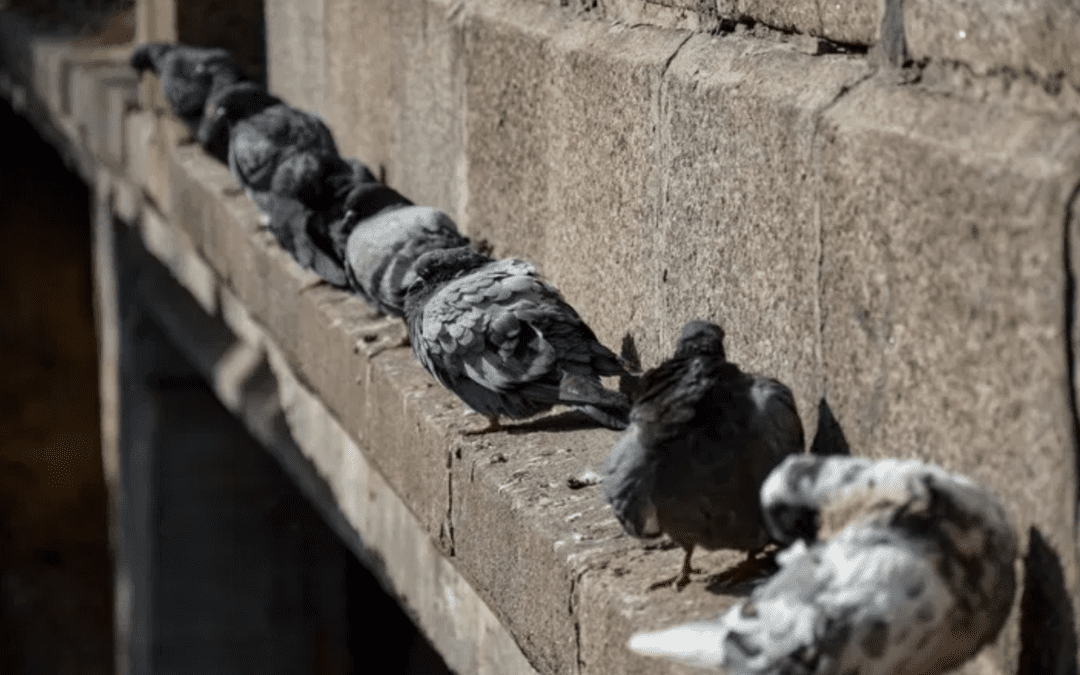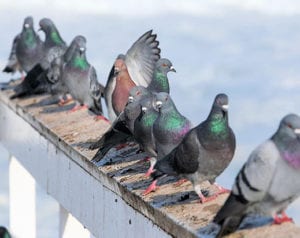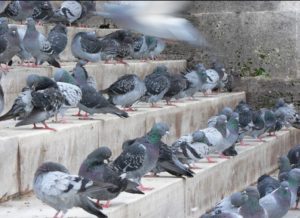
by Pigeon Patrol | Nov 23, 2020 | Bird Deterrent Products, Bird Netting, Pigeon Control, Pigeon Droppings, Pigeon Patrol's Services, Pigeon Spikes
Do you have pigeons roosting at your property? Not sure if they cause any harm or if you should get rid of them? Keep on reading to find out what pigeons may do to your property!

Pigeons may seem harmless, but these pest birds cause millions of dollars in damage every year to buildings, ventilation systems, machinery, statues, roofs, and much more. Bird droppings and nesting materials left by pigeons pose physical problems and health hazards that can become very serious if not corrected quickly making prompt and effective professional bird control is often essential.
Pigeons Roosting
Pigeons find our window ledges, rooftops, bridges, and warehouses to be ideal substitutes for the natural ledges in cliff sides that they have always used as roosting, nesting, and sheltering sites. When flocks grow too large and become a nuisance, killing the birds is often the first plan of action.
Potential Health Hazards:
There are many health risks associated with pigeons and their droppings. The bacteria, fungi, and ectoparasites that they and their droppings harbor are numerous. The four most common ways disease is passed by bird to human are: inhalation of fecal dust, food and water contaminated with bird feces, direct contact with feces, and parasitic transfer.
Pigeon droppings can expose humans to many diseases, including salmonella, Newcastle disease, candidiasis, encephalitis, orthosis, and toxoplasmosis. In addition, they can also carry cryptococcosis, and coccidiodomycosis, which cause meningitis. The droppings may also harbor growth of fungus, which causes histoplasmosis. Fleas, lice, mites, and other pests often live on these birds, hitching a ride to where ever they want to jump off. Pigeons may also attract other pests, such as rats, which feed on dead pigeons and food that well-intentioned bird lovers may scatter for them.
In addition to disease, bird droppings are known for triggering  people to slip and fall, which makes it especially important to rid the birds from highly trafficked areas. Source
people to slip and fall, which makes it especially important to rid the birds from highly trafficked areas. Source
Damage Caused by Pigeons:
These are messy birds, leaving droppings everywhere they go, particularly near their roost sites. Pigeon droppings are not just gross, they are also full of uric acid which makes them extremely corrosive. The droppings are the direct cause of millions of dollars in damage to buildings and other structures. Particularly vulnerable are painted surfaces, awnings, signs, and other similar surfaces. A tragic example of the corrosiveness of pigeon droppings is the Minnesota bridge accident in 2007, which was found to be the direct result of bird droppings eating away at the metal bridge supports until they weakened.
In addition to the damage cause by their acidic droppings, pigeon nests can also cause damage. Pest birds will often build nests in gutters or on roof corners blocking essential drainage systems. Every year several warehouses experience roof damage, and even collapse, when drainage systems have been blocked and standing water rises just six inches. Bird nests can also block ventilation systems, which not only prevents exhaust of potentially harmful gases, but also has the potential to spread diseases. Fire is also a potential hazard. Nesting materials are usually flammable, consisting of twigs, straw, grasses and dried droppings. When pest birds build their nests inside electric signs or other machinery there is a great risk of fire.
Pigeons are creatures of habit and highly social. Once they have found a cozy spot the will return again and again, bringing along more of their pigeon pals. Prolific breeders, pigeons can hatch several broods a year, sometimes even laying a new clutch before the previous have even hatched. Often our buildings and structures have architectural features such as drain spouts and eaves that make perfect nesting spots for these birds. Pigeons are comfortable around humans and they’re hard to scare away or deter. Once a flock of stubborn unwanted pigeons have set up shop in/on your building, it can be stubbornly resistant to removal, often requiring the services of a pest control or animal control professional. As is true of many pests that invade our homes and businesses, the first step to controlling feral pigeons is to remove their food source.
Tips to deter pigeons:
- Don’t feed the pigeons.
- Screen drains and gutters to make your property less attractive to pigeons.
- Encourage children to pick up spilled food – and teach them NOT to feed pigeons
- Keep areas around trash bins and outdoor dining areas clean
- Eliminate water sources such as bird baths, over-watered lawns, or kiddy pools.
If you need help to prevent or eliminate pesky problem pigeons, please contact us!
Hope you learned more about why you should take action when pigeons are roosting on your property
About Pigeon Patrol:
Pigeon Patrol Products & Services is the leading manufacturer and distributor of bird deterrent (control) products in Canada. Pigeon Patrol products have solved pest bird problems in industrial, commercial, and residential settings since 2000, by using safe and humane bird deterrents with only bird and animal friendly solutions. At Pigeon Patrol, we manufacture and offer a variety of bird deterrents, ranging from Ultra-flex Bird Spikes with UV protection, Bird Netting, 4-S Gel and the best Ultrasonic and audible sound devices on the market today.
Contact us at 1- 877– 4– NO-BIRD, (604) 585-9279 or visit our website at www.pigeonpatrol.ca
Pigeon / Pigeon Patrol / Pigeons Roosting / Vancouver Pigeon Patrol / Bird Control / Surrey Pigeon Control / Pest / Vancouver Pigeon Blog /

by Pigeon Patrol | Nov 2, 2020 | history of pigeons
Where Are They Found?
The history of these pigeons were originally found wild in Europe, North Africa, and Western Asia, pigeons have become established in cities around the world. The species is abundant, with an estimated population of 17 to 28 million feral and wild birds in Europe alone and up to 120 million worldwide. These birds were introduced into North America in the early 1600’s. Window ledges and tall buildings mimic the rocky cliffs originally inhabited by their ancient ancestors in Europe. The pigeon has a long history of association with humans, having been used for food and entertainment for over 5,000 years. Source
How Many Species Are There?
Pigeons live worldwide except in the coldest regions and the most remote islands. About 250 species are known; two-thirds of them occur in tropical Southeast Asia, Australia, and the islands of the western Pacific, but the family also has many members in Africa and South America and a few in temperate Eurasia and North America. All members of the family suck liquids, rather than sip and swallow as do other birds, and all pigeon parents feed their young “pigeon’s milk,” the sloughed-off lining of the crop, the production of which is stimulated by the hormone prolactin. The nestling obtains this “milk” by poking its bill down the parent’s throat.
Pigeons are gentle, plump, small-billed birds with a skin saddle (cere) between the bill and forehead. All pigeons strut about with a characteristic bobbing of the head. Because of their long wings and powerful flight muscles, they are strong, swift fliers. Pigeons are monogamous; i.e., they mate for life, and the survivor accepts a new mate only slowly. The female lays two glossy white eggs in a flimsy nest that barely holds them. The female generally incubates the eggs by night, the male by day. The incubation period is 14 to 19 days, but the young are cared for in the nest for another 12 to 18 days. Source
Contact Us For Any Questions!
(604) 585-9279
About Pigeon Patrol:
Pigeon Patrol Products & Services is the leading manufacturer and distributor of bird deterrent (control) products in Canada. Pigeon Patrol products have solved pest bird problems in industrial, commercial, and residential settings since 2000, by using safe and humane bird deterrents with only bird and animal friendly solutions. At Pigeon Patrol, we manufacture and offer a variety of bird deterrents, ranging from Ultra-flex Bird Spikes with UV protection, Bird Netting, 4-S Gel and the best Ultrasonic and audible sound devices on the market today.
Contact us at 1- 877– 4– NO-BIRD, (604) 585-9279 or visit our website at www.pigeonpatrol.ca
Bird Gone, Pigeon Gone, Seagull Gone, Pigeon problems, pigeon spikes, 1-877-4NO-BIRD, 4-S Gel, Bird Control, Pigeon Control, bird repellent, Bird Spikes, sonic bird repellent, stainless steel bird spikes, bird spikes Vancouver, Ultra Sonic Bird Control, Bird Netting, Plastic Bird Spikes, Canada bird spike deterrents, Pigeon Pests, B Gone Pigeon, Pigeon Patrol, pest controller, pest control operator, pest control technician, Pigeon Control Products, humane pigeon spikes, History of pigeons, pigeon deterrents, pigeon traps, Pigeon repellents, Sound & Laser Deterrents, wildlife control, raccoon, skunk, squirrel deterrent, De-Fence Spikes, Dragons Den, Canada bird spikes, Canada pigeon, pigeon control, pigeon patrol, pigeon. Kill pigeons, crow, starling, Pigeon Habitat, Pigeon identifications, Pigeon Spikes, Ultrasonic Pest Repellers
The post History of Pigeons appeared first on Pigeon Patrol Canada – Bird Control Products & Services.
Filed Under: Pigeon Patrol’s Services

by Pigeon Patrol | Aug 22, 2019 | 4-S Gel Bird repellent, Animal Deterrent Products, Bird Deterrent Products, Bird Netting, Pigeon Patrol's Services, Pigeon Spikes, Pigeons in the News, UltraSonic Bird Control

The New Zealand pigeon or kereru has a liking for fermented fruits, which contain alcohol.
New Zealand has voted for its bird of the year 2018 and it’s one known for being “drunk, clumsy and a bit of a clown”, organizers said on Monday.
The New Zealand pigeon or kereru has a liking for fermented fruits, which contain alcohol which means that the birds can get quite tipsy at times, displaying clumsy antics and falling off trees, reports the BBC.
This year’s campaign saw celebrity endorsements from actor Stephen Fry and comedian Bill Bailey, while one species even had a profile on dating app, Tinder.
The kereru is one of the few native birds in New Zealand that is not endangered.
“They have quite a reputation of being large and clumsy and being a bit of a clown,” Megan Hubscher of Bird and Forest, a conservationist group that runs the annual vote, told the BBC.
The bird loves fruit and depending on the season, these fruits might be fermented. Hence, the bird will get drunk.
“There are a lot of videos around of kereru getting drunk and stumbling around in a comical manner,” Hubscher said, adding “That’s part of the charm. they’re just very loveable birds”.
The whole campaign to elect a bird of the year is run to draw attention to New Zealand’s birds and the threats they face.
Prime Minister Jacinda Ardern congratulated the kereru even though she had been rooting for the taiko, or black petrel.
Have a Pigeon Problem?
Pigeon Patrol Products & Services is the leading manufacturer and distributor of bird deterrent (control) products in Canada. Pigeon Patrol products have solved pest bird problems in industrial, commercial, and residential settings since 2000, by using safe and humane bird deterrents with only bird and animal friendly solutions. At Pigeon Patrol, we manufacture and offer a variety of bird deterrents, ranging from Ultra-flex Bird Spikes with UV protection, Bird Netting, 4-S Gel and the best Ultrasonic and audible sound devices on the market today.
Voted Best Canadian wholesaler for Bird Deterrent products eight years in a row.
Contact us at 1- 877– 4– NO-BIRD, (604) 585-9279, or visit our website at www.pigeonpatrol.ca
 people to slip and fall, which makes it especially important to rid the birds from highly trafficked areas. Source
people to slip and fall, which makes it especially important to rid the birds from highly trafficked areas. Source



